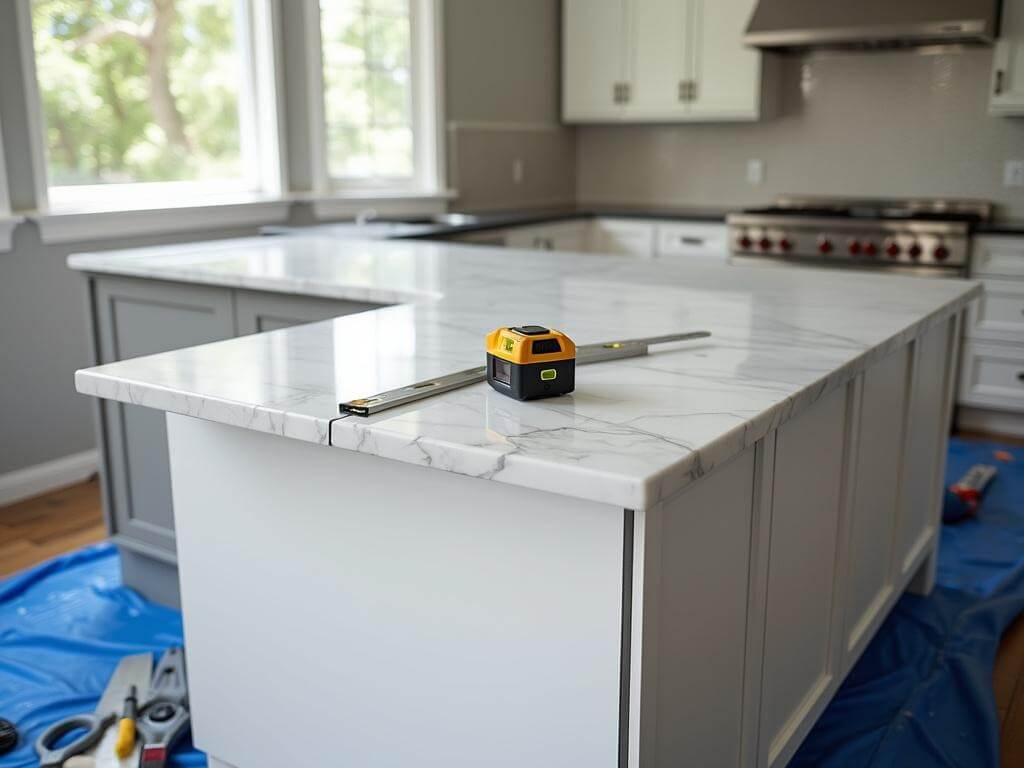The Ultimate Guide to Countertop Installation and Quartz Countertops in Allen
Countertop installation in Allen has become a hot topic among homeowners—and for good reason.
If you're renovating a kitchen or starting fresh with a new build, the choices might feel overwhelming at first. Who installs it? What materials are best? Which countertop lasts the longest? Is quartz really worth the hype?
Let’s break this down so it actually makes sense, from someone who’s been through it dozens of times—with clients and in my own home.
How a Professional Countertop Installation in Allen Actually Works
Anyone can sell you a slab, but here’s where the magic happens: full-service countertop installation.
In Allen, most professional installers handle the full pipeline—from sourcing the materials to templating, fabricating, and final install.
Think of it like this:
- You don’t want five different contractors “trying their best” to guess each other’s measurements.
- You want one solid crew that handles it all—or it can get messy fast.
Here’s the usual step-by-step (and what happens behind the scenes):
- Initial consultation: You’ll meet with a project manager and possibly a designer (Rachel Winston, if you're lucky—she’s magic with space visualization) to scope the project.
- Material selection: Quartz slabs? Granite? Marble-look quartz or something that pairs with new white oak cabinets? They'll guide you through the options and get samples in your hands.
- Templating: This is critical. A technician comes out and laser-measures the space to create a physical or digital template.
- Fabrication: Templates go to the shop. That's where your stone gets cut and polished with custom edge profiles.
- Demolition: Old counters out. These companies won't haul it for recycling—but they’ll remove it and make sure the site’s prepped.
- Installation: Done by certified installers specializing in these materials—not random subcontractors.
- Final walkthrough: Seam checks, sink alignment, caulk lines. You sign off only when it looks perfect.
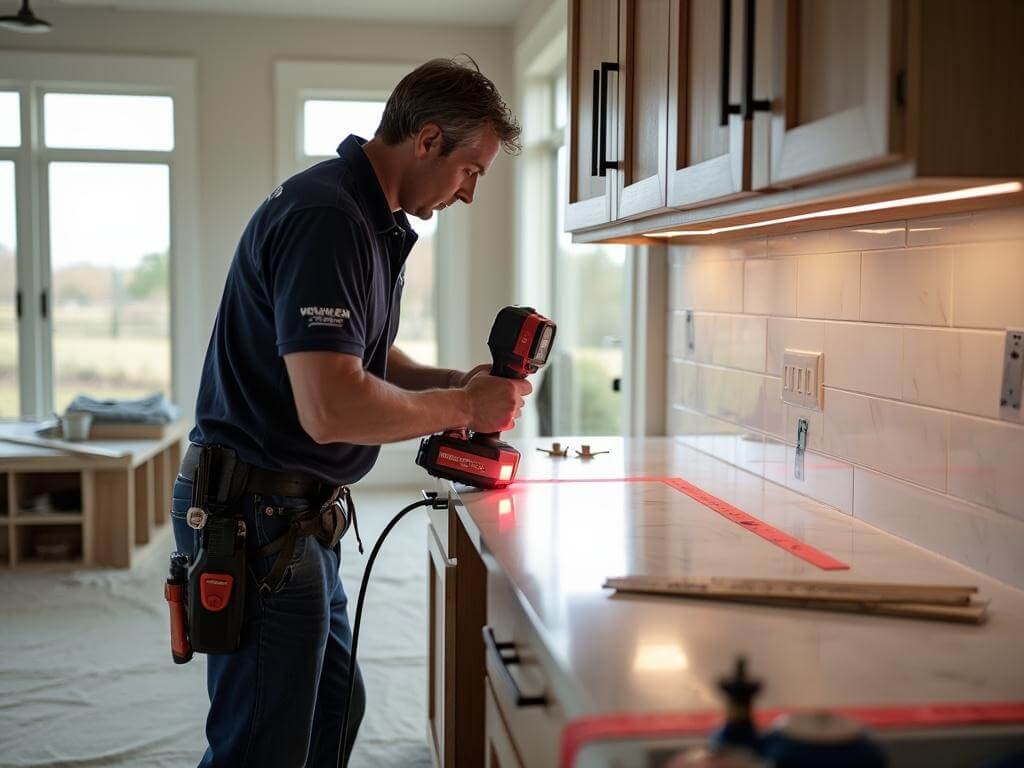
Here’s the part that’s often skipped in DIY or budget installs—minor mistakes in leveling, seams, or faucet holes can end up costing you big time.
Slapping new quartz on an unlevel cabinet is like putting new tires on a bent rim. Professional install protects your investment in the long run and ensures your warranty stays intact.
Takeaway:
Hiring a full-service countertop installer in Allen means faster timelines, better quality control, and less margin for error.
The Real Benefits of Quartz Countertops (Why They’re the GOAT Right Now)
Quartz isn’t just a trend—it’s an upgrade in every way your kitchen or bathroom needs.
Quartz is an engineered stone. It’s made from 90–95% crushed natural quartz bound together by resins and pigments. This means:
- More consistent patterns and colors than granite or marble
- Extremely dense and non-porous
- Built to take a beating—even in high-traffic kitchens or busy households
Here are the key reasons why more families in Allen are going quartz:
- It won’t stain—Red wine, turmeric, sriracha? No problem.
- Doesn’t need to be sealed ever—Unlike natural stone, it’s ready to go the day it’s installed.
- Scratch and impact resistant—Your teenager can try to “help” with dinner and the counter will survive.
- Easy to clean—Mild soap and a cloth keep it sanitary and shiny.
- Tons of design options—Want a Carrara marble look without the drama? Done.
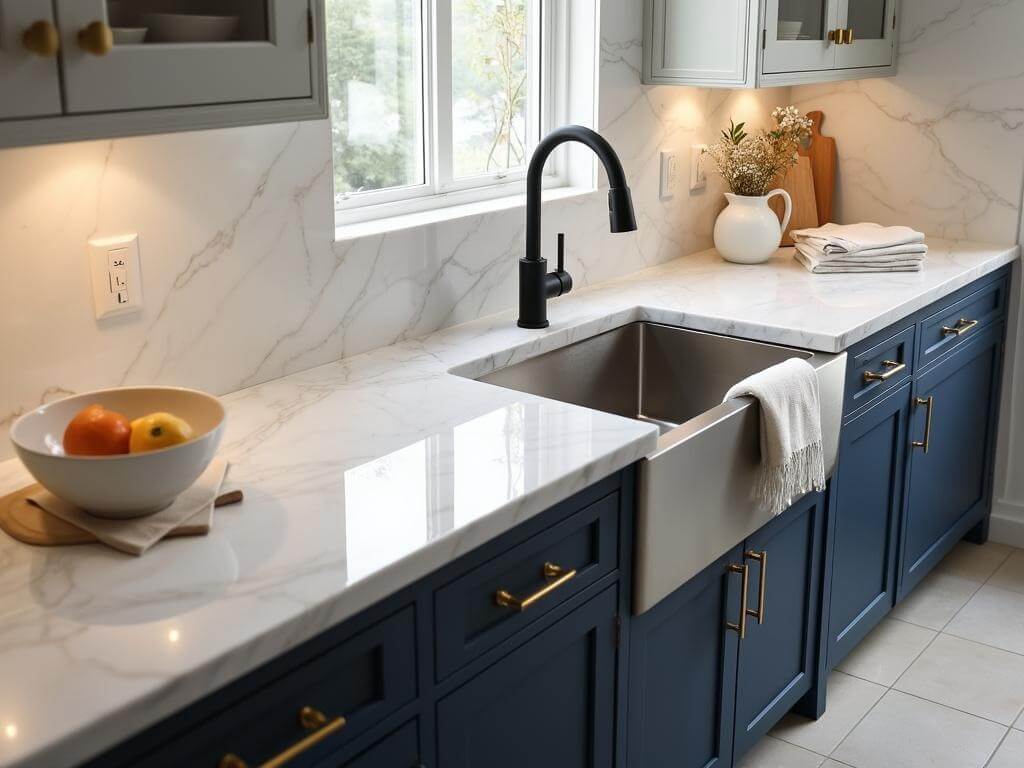
Real Talk: I installed marble in my first home years ago because I fell in love with those dreamy veins. Within six weeks, it etched from lemon juice and got stained by soy sauce that dripped behind a soap dispenser. My next house? Quartz. Never again will I play countertop roulette with natural stone in the kitchen.
Want your countertop to look like polished concrete? They’ve got that.
Prefer pure white with faint gold veining? That exists too.
And because these slabs are engineered, colors and patterns stay consistent from batch to batch—huge when you’re covering a large island or wrapping it up the backsplash.
Takeaway:
Quartz countertops are winning in Allen because they deliver on performance, design, durability, and ease of maintenance—all in one package.
Why Quartz Countertops Became Crazy-Popular (and Are Still Climbing)
The shift toward quartz wasn’t random—it’s rooted in what homeowners actually want nowadays:
- Stylish surfaces that are easy to live with
- Kitchens and baths that don’t require babysitting
- Long-term value without fussy upkeep
The pandemic only accelerated this.
More time at home meant more eyes on countertops that were either dated or full of tiny maintenance requirements. So when people started upgrading, they demanded both beauty and function.
Quartz answers that call better than granite, marble, or laminate ever could.
What makes quartz even more ideal is its versatility:
- Works in kitchens, bathrooms, utility rooms, mudrooms—even commercial spaces
- Matches all design styles: farmhouse, modern, transitional, luxury
- Expands easily—need to add a matching bar area two years later? No sweat
Plus, compared to granite or marble, it outperforms in every category that matters for daily use:
- No sealing
- Better stain and bacteria resistance
- Uniform color and pattern—no surprises when your slab arrives
Does it cost more than lower-end granite or laminate? Yes. But when you don’t have to seal it annually, worry about stains, or shell out for repairs down the road—it pays for itself.
Quick snapshot of consumer trends:
- Quartz now accounts for more than 40% of all countertop installations nationwide
- It’s been the #1 material for kitchen remodels in the U.S. for 5 years running
- New technologies let manufacturers mimic luxurious marbles or industrial concrete almost flawlessly
Takeaway:
The popularity of quartz countertops exploded because they solve real problems and look amazing doing it.
Coming up next: we’ll look under the hood of quartz even more and break down the pros, cons, and common myths you need to know before committing.
What Most Contractors Won’t Tell You About Quartz Countertops
Here’s the part you won’t hear enough: quartz isn’t perfect.
It’s fantastic, yes. But like any building material, it comes with trade-offs.
And if you don’t know what to expect, you can fast-track disappointment.
Let’s bust a few myths and address the stuff people usually find out after the fact.
Quartz Is Heat-Resistant—But Not Heatproof
Here’s the deal: quartz can handle typical kitchen use—think warm plates or the occasional hot mug.
But set a scorching pan fresh off the stove on the counter?
Not good.
I learned this the hard way after leaving a cast iron skillet on the island during brunch. It only sat there five minutes… but that resin? It doesn’t forgive. My countertop ended up with a faint brown shadow I couldn’t unsee.
Lesson: Use trivets or heat pads if it’s hot enough that you’d hesitate to touch it bare-handed.
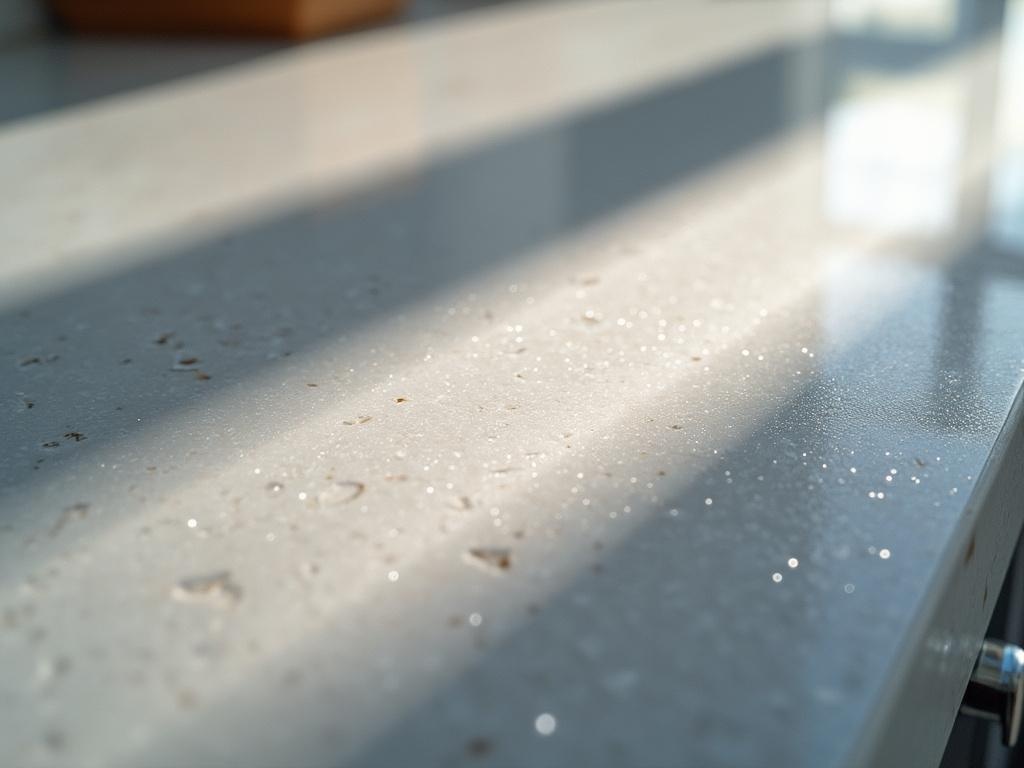
Sunlight Can Be Its Kryptonite
Quartz is a champ indoors—but take it outside, or install it under a massive skylight, and you might see it fade over time.
Why?
UV sensitivity.
Some slabs will show yellowing or a slight color shift if exposed to full sun for years straight—especially in warm climates like Texas.
Solution: For backyard kitchens or sun-drenched rooms, ask about UV-resistant quartz options.
Stick to highly rated manufacturers known for fade-resilient resins.
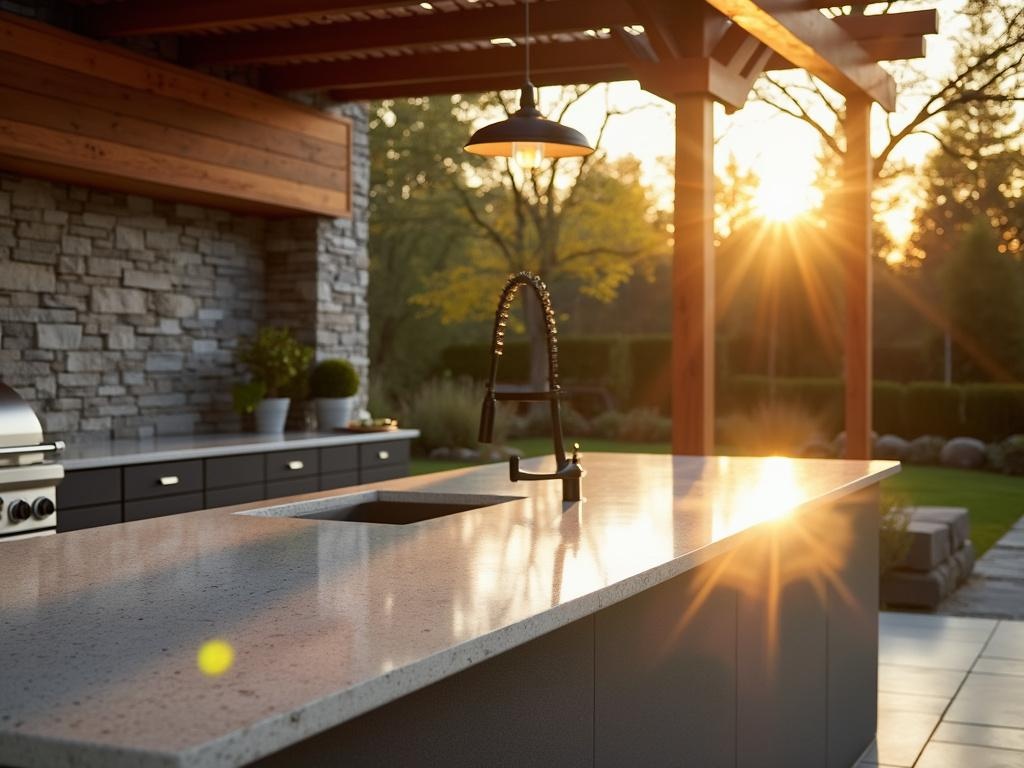
Cost Isn’t Just About the Sticker Price
Yes, quartz costs more than low-end options like laminate or prefab granite.
But here's what most people forget to factor in:
- No sealing products to buy yearly
- No specialized cleaners or stain removers
- Drastically fewer repairs
- Longer replacement cycle
In other words—less hidden upkeep.
Think of it like buying a fuel-efficient car. The gas tank might cost more upfront… but year over year, it wins.
Takeaway:
Quartz is nearly bulletproof in the kitchen—but don’t skip heat pads or ignore UV placement. Know the real-world rules before you install.
The Allen Playbook: What to Actually Expect During Installation
Let’s get real about timelines and what “installation” truly means inside Allen homes.
Most full-service teams here (especially the good ones) can knock out a kitchen project in 5–7 business days from templating.
That quick turnaround is possible because:
- Fabrication is done locally
- Crews specialize in quartz and are trained by the manufacturer
- They aren't juggling 100 jobs at once
Translation: less chaos in your house.
A kitchen in Allen with new quartz countertops typically follows this rhythm:
- Day 1: Consultation + design
- Day 2–3: Templating and slab selection
- Day 4–5: Fabrication in-shop
- Day 6: Old surface removal + new install
- Day 7: Final walkthrough and sign-off
It’s fast—but only when you work with a crew that handles it start to finish.
They don’t need to chase down subcontractors.
And because they source locally, your slab doesn’t sit in a backorder limbo or arrive cracked from three states away.
Takeaway:
Local, full-service installers in Allen cut down on lead times, headaches, and quality issues. Your new kitchen won’t take months.
How to Choose the Right Contractor (Spoiler: It’s Not a Random Google Search)
Picking a team to install your quartz isn’t just about who gives the lowest quote.
It’s about who does it right—and who stays accountable when something goes sideways.
Here’s what you want:
- They do materials + fabrication + install. If it’s one company doing all three, a mistake doesn’t get passed around like a hot potato.
- They have plenty of quartz experience. Quartz needs different tools and techniques compared to granite or laminate.
- Designers are part of the team. This matters. Rachel Winston, an award-winning in-house designer, creates smart layouts that maximize beauty, function, and resale value.
- They know the Allen market. Not just the materials—but what styles, trends, and tolerances make sense for North Texas homes.
Also worth noting:
- They don’t recycle old countertops—but will haul them away.
- Permitting isn’t offered—but quartz installs usually don’t require it unless structural changes are made.
And (this is big): Ask who’s responsible if something chips, cracks, or stains a month in.
If their installer isn’t certified on the brand you're buying, then the warranty might be toast.
Takeaway:
Only trust your quartz install to a full-cycle team with specialized skills, design support, and clear accountability. Shortcuts aren’t worth the savings.
Why the Pros Pick Quartz for Commercial Sites, Too
It’s easy to think of countertops in terms of home kitchens—but quartz is the go-to for offices, cafés, salons, and even hospitals in Allen.
Why?
Same reasons, different stakes:
- Commercial use means spills, grime, high foot traffic—daily.
- Cleanliness is non-negotiable.
- Repairs create downtime. Quartz rarely needs them.
- Visual consistency matters across large installations.
For example: A local spa I worked with chose a pristine white quartz for their check-in area, bathrooms, and break room.
It’s been three years. Still gleams like day one.
They clean it with dish soap and water.
Never sealed it.
And it stands up to cleaning solutions, oils, water stains, and everything else guests throw at it—literally.
If it works for hospitals and showrooms, it’ll survive your family taco nights without issue.
Takeaway:
If business owners are choosing quartz for ultra-demanding public use, you can trust it in your home. It’s the professional’s pick for a reason.
Want Sustainable? Quartz Is Catching Up
Not long ago, eco-friendly counters meant dull colors and weird textures nobody really loved.
That’s changed—big time.
Today’s top quartz brands are integrating:
- Recycled glass and stone aggregates
- Low-VOC resins for better indoor air quality
- Energy-efficient fabrication processes
Some brands are even producing quartz surfaces using solar-powered facilities.
Is it 100% green across the board? No.
But compared to granite (which requires mining, transport, and sealing), quartz edging ahead.
And if sustainability is a priority in your remodel, ask for specific lines with recycled content.
Your installer can show you exactly which slabs check the environmental boxes—without sacrificing style.
Takeaway:
Quartz has closed the sustainability gap. Choose smart, and your kitchen can be both beautiful and better for the planet.
The Final Verdict: Should You Go Quartz?
Still on the fence?
Here’s how I frame it whenever a client’s torn between options:
If you love the look of natural stone—but not the upkeep, the stress, or the stains—then quartz is your best bet.
It’s visually stunning and structurally solid.
Offers luxury without labor.
And in Allen’s fast-growing, style-savvy housing market, it adds serious resale value.
Pair it with a smart, full-service install team—and your kitchen or bath becomes a worry-free showpiece for years.
Call them once. Get the material, the design, the fabrication, and the install all under one roof.
Save your weekends for brunch—not researching caulk lines and edge profiles.
Call it smarter remodeling.
Call it peace of mind on a countertop.
Call it quartz.
If you’re ready to upgrade, explore your quartz countertop options with Allen’s most trusted fabricator and installer at (972) 964-5500. You’ll quickly see why they lead the way in custom countertops in Allen.

